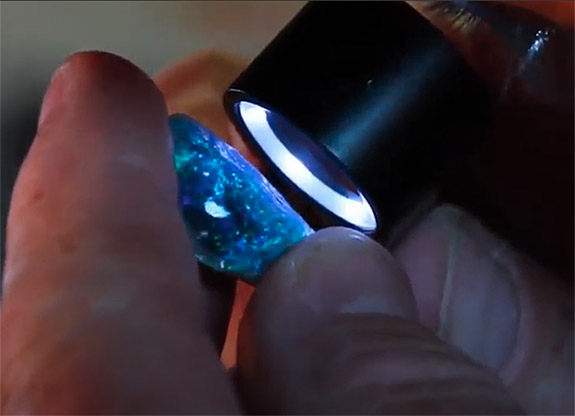During the thrilling season finale of Outback Opal Hunters, 21-year-old Sam Westra and his mentor Pete Cooke discovered a 45-carat double-faced black opal valued at AU$120,000 (about US$89,000).
The "life-changing" find marked a 180-degree turn of fortune for the team that had suffered through a woeful three-month period of losing money in Australia's remote and inhospitable interior.
Fans of the Discovery Channel's hit reality TV show have been rooting for the likable team from Lightning Ridge, NSW. The success of their entire season hinged on their final cleanup — four tons of fractured stones collected from the 100-year-old open cut mine they call "Old Nobbys."
"Plenty of material, just potch everywhere," said Westra as he and Cooke began the sorting process in the video below. "Just got to get the big one, mate. Where's the big one?"
Potch is the term for the near-worthless rocky material that has the same chemical makeup as precious opal with one critical difference. With potch, the tiny silica spheres that make up the stones are jumbled. In precious opal, they’re all laid out evenly, which gives the structure the ability to break visible white light into separate colors.
Within a few minutes, Cooke encountered a small, but valuable, stone that presented hints of green, blue, red and orange.
"There's a gem there for sure. We're on the money, mate," said Cooke. "This is fantastic."
But then the mining veteran turned absolutely giddy when he spied the "king stone," the best stone of his parcel.
"These come up two or three a lifetime, if you’re lucky,” said the gleeful Cooke as he rotated the stone for the Discovery Channel's viewers.
Although initially valued at AU$55,000 on camera, the team later met with an opal carver who confirmed that the actual value was AU$120,000. The gem, which Cooke dubbed "Fire and Ice" because of its brilliant flashes of red and deep blue, is the most valuable opal unearthed to date by any of the Outback Opal Hunters.
About 90% of the world’s finest opals are mined in the harsh outback of Australia, where a unique combination of geological conditions permitted the formation of opal near the margins of an ancient inland sea.
Scientists believe that between 100 million and 97 million years ago, Australia’s vast inland sea, which was populated by marine dinosaurs, began retreating. As the sea regressed, a rare episode of acidic weather was taking place, exposing pyrite minerals and releasing sulphuric acid. As the surface of the basin dried further and cracked, silica-rich gel became trapped in the veins of the rock. Over time, the silica solidified to form opals.
Outback Opal Hunters has entertained audiences in more than 100 countries and territories.
Please check out this clip from the season finale of Outback Opal Hunters.
Credits: Screen captures via YouTube.com.

















